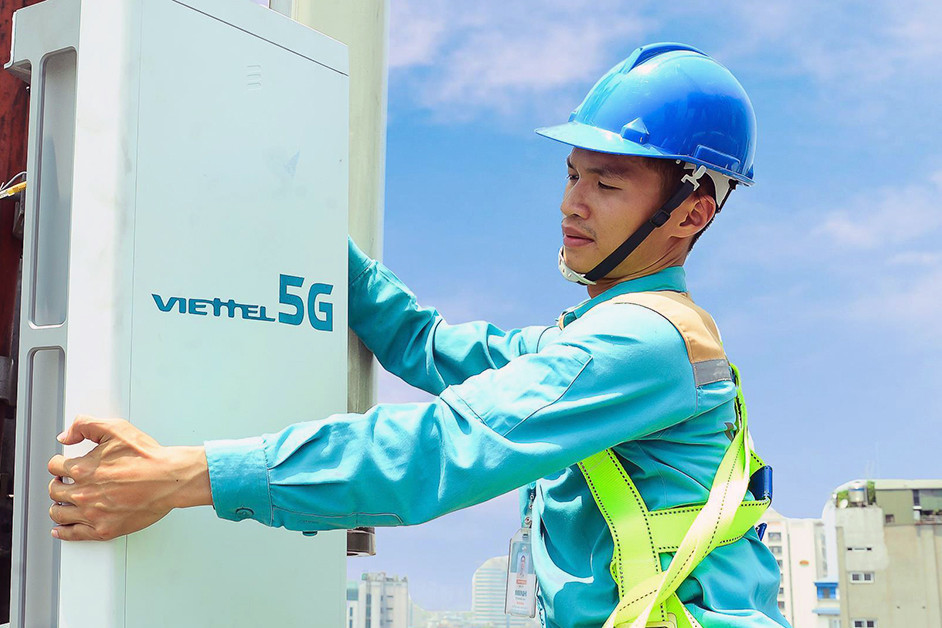
The frequency licensing in Vietnam can be divided into two phases. Before the Radio Frequency Law took effect (July 1, 2020), licenses were granted based on telecom carriers’ capability and demand, through competitive examinations. The method was used for 3G licensing.
Since July 1, 2020, the licensing has been implemented in accordance with the Radio Frequency Law, which stipulates that the licensing of the wavebands with high economic value or short supply, is implemented on the basis of competitive examinations or auctions. The Prime Minister will determine which wavebands to be put into auction.
10 years of waiting
Though the auction for wavebands is stipulated in law, no auction was implemented in the first years of the law's enforcement. Some National Assembly deputies at the fourth session of the 15th National Assembly on October 21, 2022 asked why the auction could not be organized.
Le Quang Huy, chair of the National Assembly’s Committee for Science, Technology and the Environment, said that telecom carriers were granted licenses to use frequencies to deploy 3G technology in late 2009, but carriers needed 7-10 years to launch 3G network and recover investment capital. Therefore, the auction was not applied right after the law took effect.
In December 2016, the Ministry of Information and Communications (MIC) set up an auction board to organize auctions for the 2600 MHz waveband as per the request of telecommunication carriers to deploy a 4G network.
However, MIC acted as both the agency which approved starting prices and the agency which approved investment projects of two state-owned businesses where MIC represents the state’s ownership (VNPT and MobiFone). This caused difficulties during the auction process.
In 2017-2018, MIC three times asked for instructions from the Prime Minister and relevant ministries to solve the problems.
In April 2020, the Prime Minister agreed not to apply the Decision on Auctioning and Transferring of radio frequency use rights, and to create a new decree before organizing auctions.
As such, auctioning radio frequencies is a new and complicated issue, and only when a perfect legal framework is set are auctions organized.
Initial success
Doan Quang Hoan, vice chair of the Vietnam Radio Electronics Association, said to commercialize 5G, the first thing the State needs to do is license the use of wavebands so that telecom carriers can establish network and provide services. The licensing must be implemented through auctions.
Auctioning aims to make the licensing process transparent and to collect money from the use of resources.
Le Van Tuan, head of the Authority of Radio Frequency Management, said 5G technology has become more mature than 2-3 years ago. After the experimental period, network operators are ready to provide 5G. Waveband auctioning is chosen in most countries because this is the most transparent process.
On March 8, the auction for B1 waveband block (2500-2600 MHz) was organized, and the winner was Viettel.
Digital economy
Minister of Information and Communications Nguyen Manh Hung said the country needs new digital infrastructure.
Vietnam’s digital infrastructure comprises telecommunication infrastructure, IoT infrastructure, calculation infrastructure, data infrastructure, and infrastructure for providing digital technology as a service and digital platforms.
Thr infrastructure needs to have extremely large capacity, super wide bandwidth, and be universal, sustainable, green, smart, open and safe. The infrastructure needs to be one step ahead to accelerate national digital transformation, the digital economy and digital society.
In 2024, MIC will commercialize 5G throughout the country. 5G in Vietnam will be like a ‘data highway’, which opens up great opportunities for digital transformation.
Hidetaka Shiraishi of Huawei Technologies said that while a traditional economy is developed based on natural resources such as ore, minerals and fossil fuel, a digital economy is developed by using data. 5G shows the transition from a traditional economy to a digital economy more clearly.
5G has become a driving force for the development of the digital economy. Ericsson estimates that 5G may make a 7.3-7.4 percent contribution to Vietnam’s GDP by 2025.
